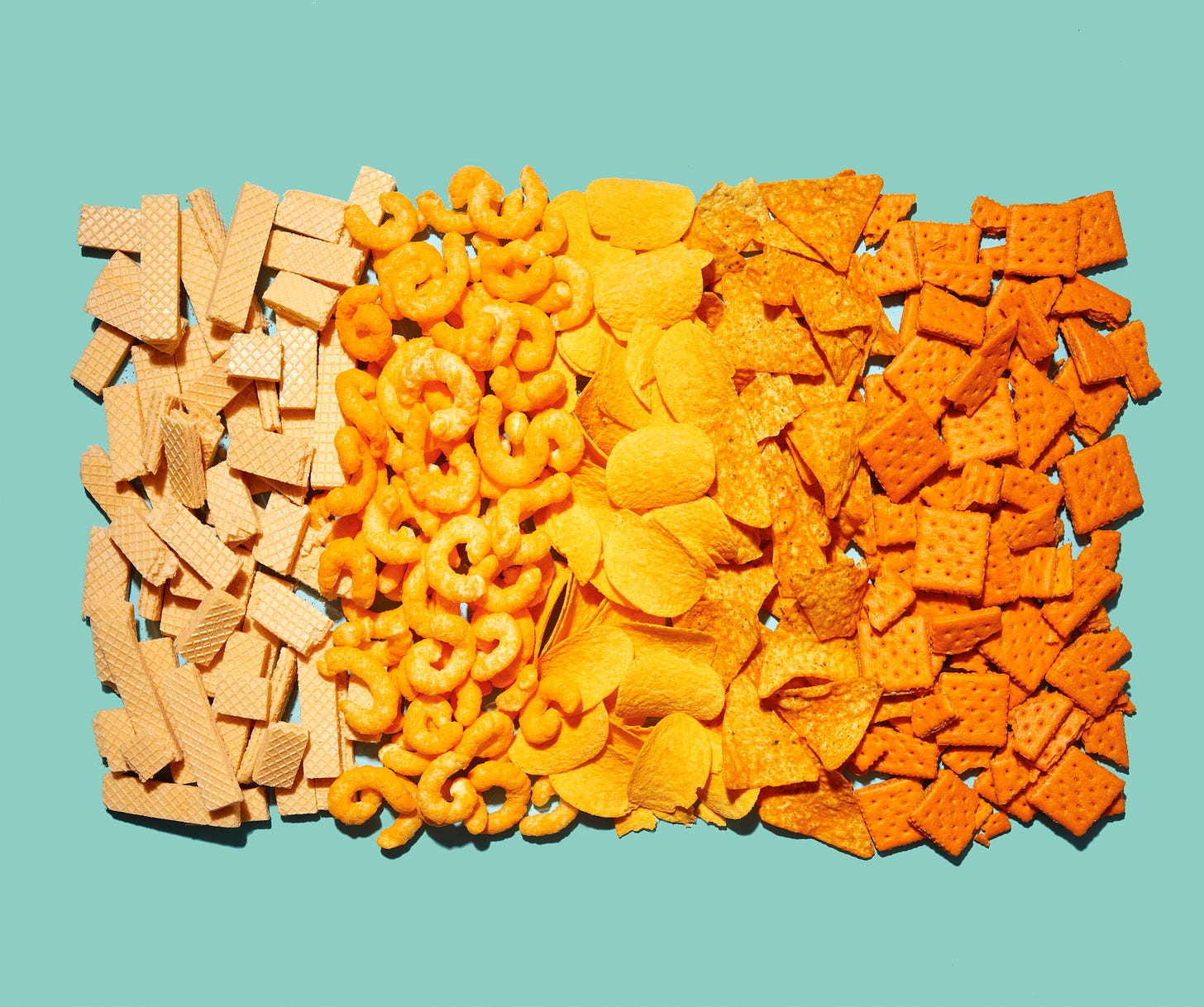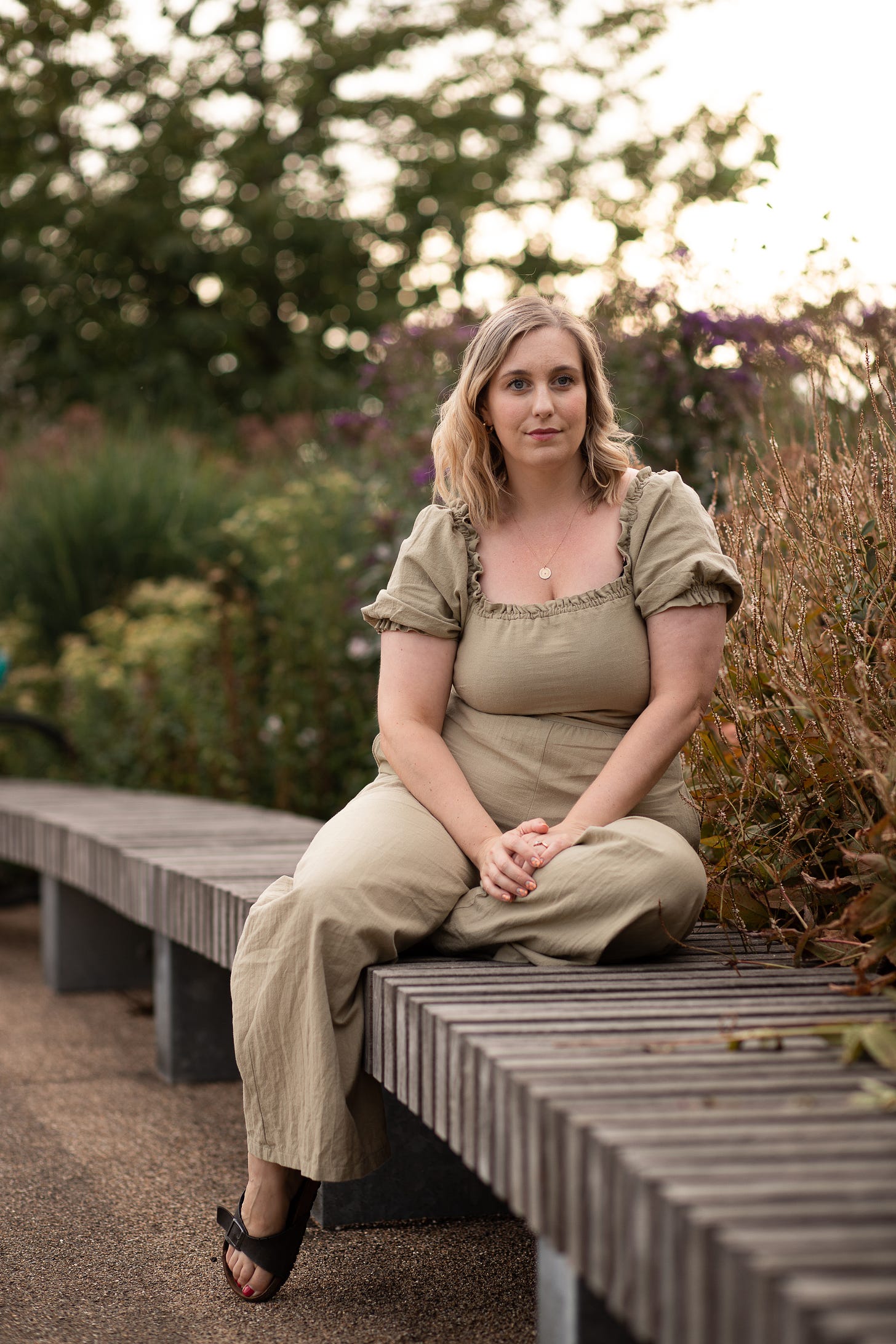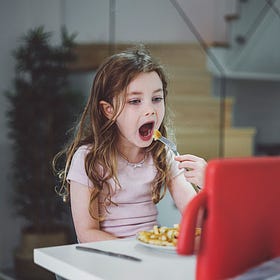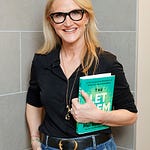You’re listening to Burnt Toast! This is the podcast where we talk about diet culture, anti-fat bias, parenting, and health. I’m Virginia Sole-Smith. I also write the Burnt Toast newsletter and I’m the author of Fat Talk.
And it’s time for Part 2 of our ultra processed foods series with !
ICYMI, read Part 1 here. We got into which foods get classified as processed and ultra processed and why—and who is harmed by these labels and the classist, racist connotations they carry. This is all inspired by the amazing three part series Laura wrote for her own Substack, so don’t forget to read that too. And now, we’ll get into all of your nitty gritty questions about UPFs!
PS. If you’re enjoying the podcast, make sure you’re following us (it’s free!) in your podcast player! We’re on Apple Podcasts, Spotify, Stitcher, and Pocket Casts! And while you’re there, please leave us a rating or review. (We like 5 stars!)
Episode 102 Transcript
Virginia
Okay, so we’re going to dive into some of your questions now, and Laura is going to help us think through all of this a little more.
Can our bodies really differentiate between ultra processed foods and less processed foods?
Laura
It just depends. I could go to the store and buy some shop bought cookies, right? They would be considered ultra processed. I could bake virtually the same cookies at home and they would be called processed cookies, but the way that my body responds is probably fairly similarly.
Virginia
Right. To your body, it’s all a cookie.
Laura
Some of the pushback around ultra processed food from within the nutrition community is that the label of “ultra processed food” doesn’t tell us anything about the qualities of that food that can’t be explained by more traditional metrics that we would use within nutrition.
I’m thinking about things like energy density, intrinsic fiber, glycemic load, and added sugar. All these tools that we already have to determine how our body will respond to something can just as easily tell us how our bodies will respond. I don’t think there’s anything special about ultra processed food in and of itself, if a food has lower fiber regardless of whether it was made in a factory made or made in our house, it’s going to respond slightly differently in our bodies. It’s more about the overall properties of a food, rather than where it’s processed.
Virginia
Your body is not like, “This is a Frito Lay product and I can tell because I’m having a different reaction.”
Laura
No, but it can be like, “well, this is an apple and therefore, it’s actually not going to provide me enough sustenance to keep going,” right? We have receptor cells in in our gastrointestinal tract that tell us about the nutrient density of the food. And spoiler, if you’re not eating enough food, it’s going to send that feedback and it’s going to start pumping out more hormones that ramp up your appetite because we don’t have enough. So, our bodies can tell foods apart to some extent, but that’s not exclusively processed versus ultra processed foods.
Virginia
That’s probably the thing bodies are least focused on, in a way.
Laura
Yeah, it’s like, “Is this meeting my needs.”
Virginia
Any links that you’ve come across in your research between ultra processed foods and mental health?
Laura
This is something that I didn’t go into specifically, but it’s something that I tangentially read around. Mental health is so multifaceted that it’s really difficult to tease apart what is the effect of our diet versus what is the effect of some of these other variables that mean that we are eating an ultra processed food diet in the first place. Does that make sense? Like, because we’re having to work three jobs to make ends meet and we don’t have time to cook a meal from scratch. Both of those things independently could have an impact on your mental health.
Virginia
Right. But it wouldn’t be because you’re eating the ultra processed food that you have the mental health outcome.
Laura
It might be because you’re having poor sleep. And the narrative is that we’re to blame for our mental health when we need to be really conscious of these broader structural influences over mental health.
Virginia
Super important. Okay, this person writes:
I have a kiddo with ARFID and almost all safe foods would be considered ultra processed foods. How much is too much of a single ultra processed food?
Laura
It’s really hard to say without having a bit more information there. But what I would say is that kids with ARFID can do really well with a fairly limited diet. I would always get it checked out with a pediatric dietitian, preferably one who specializes in responsive feeding so that you can check for any gaps.
When it comes to kids who are neurodivergent or have feeding differences, their diets are never going to look like typical eaters. There are going to have to be accommodations made for that and I think there’s a little bit of grief bound up in that for parents. But those kids need accommodations and acceptance rather than stigma and being coerced or forced into feeding therapies that might actually cause more trauma and more harm.
I know you did an episode with Naureen Hunani and she is the go-to person when it comes to feeding neurodivergent kids. So yeah, go listen to that. But I think you can do well on a fairly limited diet. If you’re worried, get it checked out with pediatric dietitian who can help you plug any gaps with supplements. And then think about a responsive plan for introducing new foods and that has to be child led as well.
Virginia
I will just also add—I don’t have a child with ARFID, but I do have a child with fairly significant feeding differences. And there are definitely times where there is one food that is making up most of the meals. But I have learned that anytime we get overly hung up on that food, we only add to the stress of that dynamic and push her further from us and risk making her feel incapable in some way that’s not helpful.
My solution as a parent in this has usually been to really make peace and embrace whatever the food is, and make that our starting point, and then think about what can we add on? How can we make them feel like they have access to this safe food, and how can we add on to that versus worrying about limiting or creating guardrails around that food?
Laura
Yeah, that felt safety piece is so important.
Virginia
So important.
Okay, next reader question:
How much should we worry about added sugars and things like bread, pasta sauce, etc?
I think this is drilling into that gray area of the ultra processed food category where these are the foods we do really rely on and then we get worried about what the ultra processing might be doing to them.
Laura
I think this is tricky. I’m also writing about sugar a lot at the moment. So it’s the convergence of these two in my head. Because I don’t think there’s anything inherently wrong with picking a lower sugar pasta sauce or lower salt, provided that you’re not stressing about it and it’s not impacting the taste or flavor and you enjoy it. For example, if I’m going to be making a sauce out of a peanut butter, I might choose the one that doesn’t have added sugar or salt in it, because I’m going to be adding stuff anyway.
Virginia
And you want to control the flavor.
Laura
But if I’m straight up eating it, like, yeah, I’ll have the Jif. I don’t think there’s anything inherently wrong with looking at that if that doesn’t stress you out. If you’re newer to intuitive eating and that is going to be a bit of a headfuck, then leave it alone.
I can’t speak to the US, but in the UK, they did a really interesting study where they compared ready prepared supermarket foods with recipes that were made at home using cookbooks written by chefs like Jamie Oliver and people like that. They found that storebought foods were lower in salt and saturated fat and higher in fiber than some of the things that we made at home.
Virginia
Wow! Plot twist. Jamie Oliver did not love that, I bet.
Laura
Well, we do not love Jamie Oliver.
Virginia
No, we do not.
Laura
That’s a whole other podcast episode. What I would say is that putting pressure on the food industry to up the nutrition standards of foods like these common everyday foods—I don’t think that’s necessarily a bad thing. And it might overall contribute to population wellbeing without us each individually having to micromanage our own food and worry too much about the minutiae. Certainly in the UK, a lot of food companies are responding to that. So yeah, I don’t worry too much about that.
What about you? What are your thoughts on that?
Virginia
I never think about it at all. I was actually thinking about what I buy and —I have no idea. I honestly don’t read nutrition labels. Ever. I don’t find it useful to me. I think about how foods taste. I’m feeding a family where several people are fairly rigid about their brands. So, if it was lower sugar or more sugar, it wouldn’t matter. It wouldn’t be the thing that could decide it for me. I had stages in my life where I thought a lot more about it and it was always a gateway to restrictive thinking. So, for me, it’s much more helpful to just think about what I want to be eating and the flavor combination. And yeah, I may eat something and notice, oh, this tastes sweeter than I enjoy. But I don’t then look to see how much added sugar is in it.
Laura
And I don’t, from a nutrition perspective, recommend that we get hung up on the minutiae of detail. And so yes, if that doesn’t feel good for you, definitely not. But if you’re more in a gentle nutrition place, or especially if you are managing a chronic condition where you have to think about these things—
Virginia
For sure, I don’t want to be dismissive of that.
I think my approach to gentle nutrition is thinking about foods that sound good and about overall variety, versus drilling into the numbers. That may not work for everybody, though.
The other piece of it for me is if you are not in a restrictive mindset around these foods, it kind of doesn’t matter what the numbers on them are because you’re both not restricting them and not eating “too much” of them, with all of the caveats around the concept of “too much.” Do you know what I mean? There’s not anything in my house where I’m like, “this is all like eat so it’s really important that I understand what it contains,” because I’m eating a lot of different things.

Laura
Yeah, I think if you’re overall getting some variety, whatever that looks like to you, then we don’t have to worry about these things in specific detail.
Virginia
This person wrote:
What is the difference between ultra processed foods and processed foods? Is it just a health halo, but they are still convenience foods?
Which says to me that this person is now worrying about the entire category, or really both category 3 and 4, according to the NOVA System, and worrying that the less processed foods are also under a health halo and somehow should be avoided? I don’t know. Maybe I’m misreading the way they wrote this question. What do you think?
Laura
Well, I wonder if they are using the colloquial understanding of processed versus the NOVA nomenclature, whereby everything is processed. Like everything that you eat from scratch is processed. That’s what I wonder, is if some of the confusion was coming from there.
Virginia
It also sounds like they’re wondering like, “Okay, well, the just processed foods, the bread or the pasta sauce or what have you, is it just a health halo?” I’m picking up on a negative framing of the idea of convenience foods here.
Laura
The pasta sauce and bread that you’d buy from the supermarket would be ultra processed. And so you’re thinking the fear is around those foods specifically?
Virginia
She’s saying, "is it just a health halo, but they are still really convenience foods?” I guess my take is: It’s fine if they’re convenience foods. That doesn’t make them bad foods.
Laura
No, cutting down on labor and time and all the things, to me that’s a really valuable thing. Convenience is not synonymous with it’s going to cause cancer or whatever it is that they’re thinking about.
Virginia
It’s making me think, too, the “health halo” concept is one that comes up a lot where people are using it to expose, like, “here’s a product that’s marketed as if it’s very healthy, but actually, it’s not healthy,” right? Like, that’s the concept of the health halo, that this is a food that is saying it’s low in cholesterol. It’s also just often misleading, like, they’ll put “low in cholesterol” on bananas, and you’re like, but who ever thought they were high cholesterol? Like, what are you talking about?
Laura
Like gluten-free water.
Virginia
Exactly. So, you’re right, that it’s a misleading health claim. But it doesn’t actually mean that the food is unhealthy. It just means they’re overstating certain aspects of it.
Laura
I get frustrated with health halos not because they’re inherently good or bad foods or healthy or unhealthy, it’s the manipulation from the food industry. That annoys me. I’m being marketed to and I don’t like that. I don’t want that. It can be exploitative in that water doesn’t have gluten in it anyway, but now you’re putting a premium on it.
The other place that I see health halos is with like veggie straws for kids. A lot of kid foods. It’s not that there’s anything wrong with those foods, but they’re just chips. Let’s just call a spade a spade.
Virginia
Yeah, that’s helpful. Okay. So the next question is:
What is the impact of ultra processed foods on A1C and cholesterol? I truly believe that all foods fit, but I have to watch both of those numbers.
Laura
I didn’t research this specifically, but there was an interesting study that they did at the National Institutes of Health where they did a randomized control trial. It was only over two weeks, but they compared a group of people, I think it was 20 people total, so maybe 10 people on an ultra processed foods diet and 10 people on unprocessed diet, eating a lot of salads and stuff like that. Then they crossed them over and they swapped diets for two weeks. They looked at certain biomarkers from people after each arm of the trial. They found no difference in blood glucose response between an ultra processed or an unprocessed food diet.
Now, there’s kind of a caveat because in the ultra processed food diet, they did supplement with fiber, which we know will help level out blood glucose levels. So, we don’t know exactly. But if you were overall getting a decent amount of fiber, if you’re combining foods that you know are going to affect your blood glucose level, like foods that are higher in carbohydrates with some fat and protein, again, thinking about that gentle nutrition aspect of things, then I think you’re going to be absolutely fine.
And overall, what I would say when it comes to blood glucose management is that stress is one of the worst things. So if you’re stressing about the minute details about your food, I think it’s worth taking a step back, maybe working with an anti-diet nutritionist or dietitian, if you can access that. I also put together a guide to managing a whole different bunch of health conditions, including high blood glucose.
Virginia
That sounds super helpful. I think your larger point about—and we’ve said this over and over—anytime you’re worried about a specific category of food’s impact on a specific aspect of your health, you’re probably missing a larger picture and discussion. One piece of the puzzle is not necessarily going to help with the overall puzzle. I think that’s really, really helpful to say.
Okay, the last question, which I really love is:
What’s the most useful thing you have learned in all of the incredibly extensive research you have done on this topic?
Laura
This is not a fact because it’s just my subjective opinion, but reading that statement from Carlos Monteiro about the role of ultra processed foods and that being the undoing of family meals just kind of blew my mind.
Virginia
I’ll never stop being mad, Laura.
Laura
It was so anti-science and so just “here’s my opinion.”
Virginia
I want to know how many children he has and how many nights a week he cooks dinner for them. That’s all I want to know.
Laura
And how many of them have feeding differences.
Virginia
Who is doing the labor of food in his household? Because I don’t believe it is Carlos.
Laura
So that was pretty startling to me. But just thinking again about the the huge sweeping sentiments in the way that ultra processed foods are reported. Like one of the titles in this big piece in The Times in in the UK was that “Britain’s diet is more deadly than COVID.”
Virginia
Oh, my.
Laura
And I was like, The Times fact checker was not in that day.
Virginia
No, they did not use a fact checker for that statement.
Laura
I think the other thing that I found really upsetting—this is the last one, I promise—is that the narrative and the conversation about ultra processed foods is being driven by elite white men in food. Like, they’re not scientists, necessarily. They’re not researchers. They’re not even reporters, a lot of the time. They’re just food guys and there’s one doctor guy. There’s a lot of conjecture and a lot of hyperbole. What frightens me more than anything is how these people are the people that we are entrusting reimagining the food system to. It’s really scary that we’re reimagining the food system in the mind of a privileged white guy.
Virginia
This is Sam Kass, who was the Obamas’ private chef who then drove “Let’s Move” and Michelle Obama’s entire fight against childhood obesity all originated from her conversations with her thin white guy foodie friend/chef. That’s where a lot of this starts.
Butter
Laura
All right, so this time I have party barre. So party barre is a group fitness class I’ve been going to, which, usually hard pass. Since having my kid, I have a lot of pelvic stuff, like pelvic girdle pain still. So barre is one of the things that’s helpful. But doing it at home in my living room was feeling like a little inauspicious. So I found this this class, it’s local, and it’s party vibes for the whole class. They explicitly say on their website no body talk, no “you got to burn this to earn this” and none of that kind of verbiage. And they put up disco lights. They have string party lights that they put out, disco lights, they turn the lights down, and they play like the best music. So every week it’s themed some way, like Britney versus Justin. Last night it was like 90’s Boy bands.
Virginia
Oh my gosh!
Laura
It’s always just really fun. It’s it’s a little more intense than I would like but you can just kind of do your own thing and it’s super fun. So Party Barre, highly recommend if you’re in East London.
Virginia
I am jealous and would like a party barre to come to the Hudson Valley.
All right, my butter is just a classic summer butter, which is going to the local ice cream place with my kids. We all have our flavors and we look forward to it, like we go once or twice a week. And we’ve leveled up this year our dog—we have this insane pandemic puppy who’s now three and a half and finally becoming manageable. And she can now come with us to the ice cream place because we sit outside and she gets a vanilla cone and she’s the happiest creature on the planet. It’s just really fun.
Last weekend, my best friend Amy was visiting and we took the kids twice. We brought the dog with us one of the times, and I was like, this is great.
And just in the context of our whole conversation here, ice cream is ultra processed food, right? And the joy and connection we all feel having this ritual around our summer ice cream visits is, I think, incredibly good for all of our health in just so many ways.
Laura
It is! It’s so healing. They do not do ice cream bars quite like they do in the states over here. But there’s a place that I used to go to when I lived in Ithaca that had similar vibes and it’s just very like wholesome.
Virginia
Picnic tables and everyone is getting their ice cream.
Laura
I also feel like you’ve reached the apex of parenting, like I’m still at the stage where Avery will eat all the chocolate off the side of a Magnum and then just toss the ice cream. When do we get to the good part where you just sit and eat a bowl of ice cream?
Virginia
I should say straight out, taking little kids for ice cream is actually not a joyful experience to me. The amount of wet wipes you have to bring! I mean, we did it because I love ice cream. But I have so many pictures of my kids just covered, head to toe, in melted chocolate. It’s just a mess. So if that’s where you are, it’s totally fine to just bookmark this idea for a few summers from now. Just go on a date night to get your ice cream and don’t take your toddler, it’s fine. Not because they can’t have ice cream, but because it will be stressful for you.
Laura
We would just have it at home from the tub.
Virginia
But now that we have leveled up to five and nine and the dog can come too, it is really fun.
Laura
You’re living the dream, man. It’s good stuff.
Virginia
Laura, thank you. This was awesome. I love talking to you. Come back anytime, please.
The Burnt Toast Podcast is produced and hosted by me, Virginia Sole-Smith. You can follow me on Instagram or Twitter.
Burnt Toast transcripts and essays are edited and formatted by Corinne Fay, who runs @SellTradePlus, an Instagram account where you can buy and sell plus size clothing and also co-hosts mailbag episodes!
The Burnt Toast logo is by Deanna Lowe.
Our theme music is by Jeff Bailey and Chris Maxwell.
Tommy Harron is our audio engineer.




















Share this post